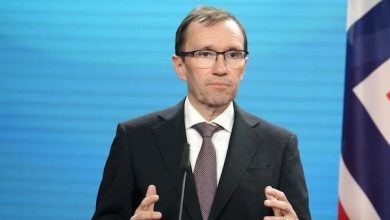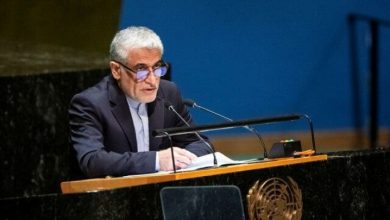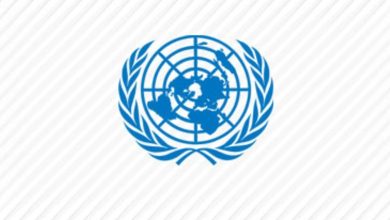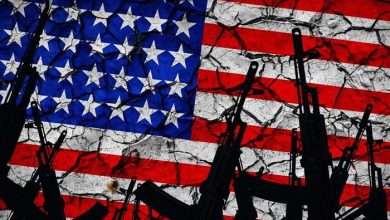
The text of this note is as follows:
The meeting between American officials and Golani in Syria has attracted the attention of many analysts of regional issues and the international system. This meeting is certainly not the starting point of the connection between Golani and Washington, but is merely a revealing point in the ongoing relations between the two. In this equation, there is basically no difference between the two traditional American parties (Democrats and Republicans). More precisely, the US investment in Golani and his associates has long been defined in the US foreign policy think tank as a macro policy, and the power transition in the White House (from Biden to Trump) does not have the slightest effect on advancing this interventionist and dangerous policy.
1- Cancel the reward for Golani’s capture!
The Biden administration announced on Friday, December 20, that it had decided to cancel the $10 million bounty for the capture of Abu Muhammad al-Julani, the leader of the terrorist group Hayat Tahrir al-Sham in Syria. The announcement came before Barbara Leaf, the top US diplomat in the region, met with Ahmed al-Sharaa (Abu Muhammad al-Julani). Al-Julani has claimed that he is not aligned with al-Qaeda or ISIS and no longer belongs to these two terrorist groups. However, members of Al-Julani’s group and his ties to the terrorists question such a claim. On the one hand, Al-Julani did not lie! He is more of a White House variable than a variable dependent on Al-Qaeda and ISIS. The policies and even the way terrorist groups operate in Syria (from Idlib and rural Aleppo to Hama and Damascus) are all defined within this interdependence. It should not be forgotten that there is always a direct and undeniable connection between the productive terrorism (America) and its affiliates around the world, especially the West Asian region and the Indian subcontinent.
2- The first official presence of the United States in post-Assad Syria
This is the first official and so-called diplomatic presence of the United States in Syria since the end of Bashar al-Assad’s rule. However, such a visit was completely formal and based on a kind of pretense, and its purpose is to present a false image of the United States’ confrontation with the developments in Syria. Accordingly, Washington is trying to portray both itself and Golani as independent (and not connected) actors in such a system. The interesting and of course ridiculous point is that the Tahrir al-Sham delegation is recognized in the United States as a foreign terrorist organization, but in the public policy-making of the United States, the absolute and excessive attachment of the Tahrir al-Sham delegation to the White House, the Pentagon and CENTCOM is undeniable. The next step for the United States is to lift sanctions on Tahrir al-Sham.
3- America’s portrayal of Golani
The purge of Golani has become a clear tactical game by Washington. The head of the so-called American diplomatic mission in Damascus (who met with Golani) claimed in his positions: “Mr. (!) Al-Sharaa has committed to abandoning terrorism, and as a result, the United States will no longer offer the reward. We spoke about the critical need to ensure that terrorist groups cannot pose a threat inside Syria or abroad, including against the United States and our partners in the region. I told him that we will not pursue the reward set in the “Rewards for Justice” (!) program.”
The rapid US reversal from calling Golani a terrorist and even holding an official and diplomatic meeting with him clearly indicates the roadmap that Washington has defined for Tahrir al-Sham and its pawn at its head (Golani) and is proceeding according to that same map. The apparent declaration of US concerns is taking place at a time when, according to solid evidence, Washington is considered the main generator of the crisis in Syria. Without a doubt, a crisis generator cannot express concern about the crisis it has created! A rule that is especially true for Washington. In other words, the dominance of terrorist groups in Syria is a result of the continuous support of the United States and its Western/Arab partners for the Syrian Takfiri groups. Therefore, Washington, as the main generator of the crisis, is fundamentally not qualified to speak about this crisis. Another important point that should be considered in this regard is the defined and codified strategy and strategy of the White House in Syria. Washington is generally opposed to weakening the Takfiri terrorist groups. To be more precise, anything that leads to weakening the Takfiri terrorists and their destruction is directly confronted by the White House and a propaganda-media frenzy is created around it.
This is the invisible but tangible protection that the United States has created around Golani and its puppets and emphasizes the expansion and expansion of its dimensions and depth. The United States considers the real liberation of Syria and the realization of its independence to be synonymous with weakening its own interests. Therefore, it is trying to stop this process in any way possible.
The next point in this regard is the US approach to the negotiations on Syria. In recent years, especially in the months leading up to the current developments in Syria, the US has sent extensive military equipment through the Turkish borders to terrorist groups. Beyond that, Washington’s insistence on maintaining Tahrir al-Sham on Syrian soil – which was conveyed through Turkey in the negotiations of recent years from Erdogan’s lips – can be evaluated in this framework. In fact, the US considers the developments in Syria and the region desirable if their outcome leads to proxy terrorism that Washington desires. Maintaining and expanding the scope of the humanitarian crisis in Syria is the main desire of the US at the current time. Obviously, from the perspective of American officials, the more the crisis in Syria expands, the more the White House’s power to intervene in foreign affairs of West Asian Countries will increase.




